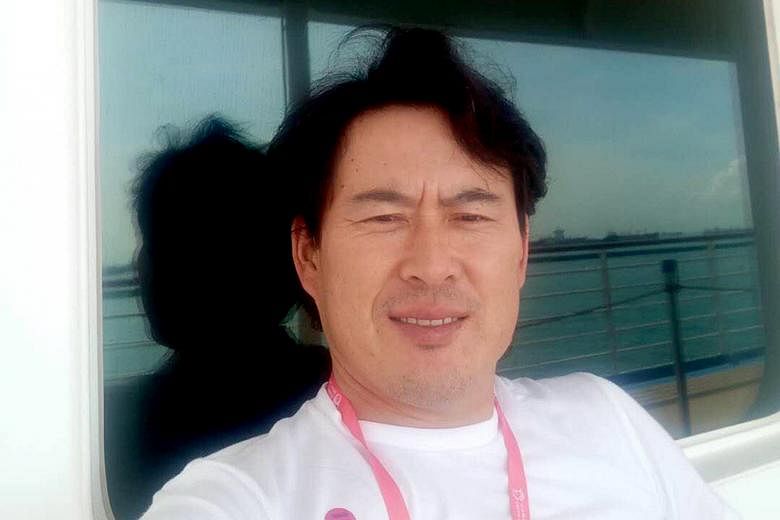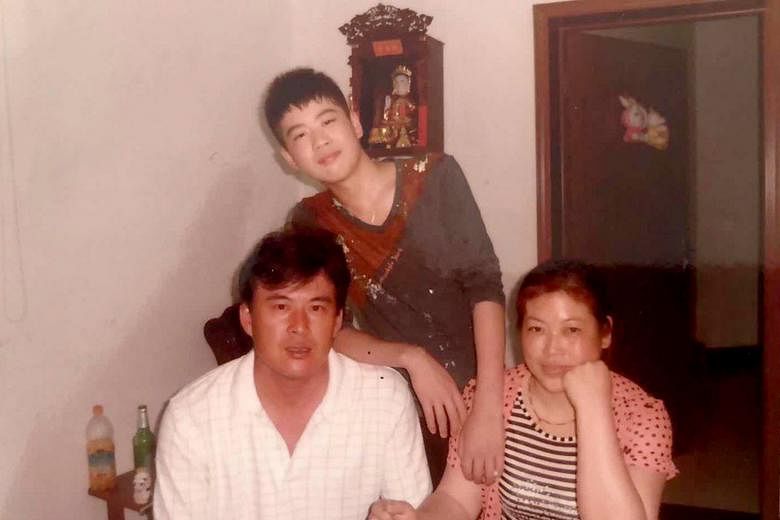Every day, foreign worker Wu Liyou would make a video call to Feidong county in China's Anhui province to chat with his family.
But last Thursday, there was no call from the 41-year-old Chinese national for the first time since April.
Instead, his employer called Mr Wu's family to tell them that he had died.
They were stunned, left speechless with grief and in disbelief, as he did not tell them he had been infected by the coronavirus, nor did they see any hint that he was ill.
Mr Wu, who had worked in Singapore for the past 10 years, became the youngest person on the island to succumb to Covid-19 last Thursday.
He died of complications two weeks after he was discharged, and was cremated yesterday evening. The coroner certified the cause of death as a massive pulmonary thromboembolism following the Covid-19 infection.
Mr Wu's son Wu Feixiang told The Straits Times over the phone from China that his father had looked healthy in all their video conversations, and never mentioned having any health problems.
The family knew there was widespread infection in the foreign worker dormitory where Mr Wu stayed, said the 22-year-old.
But his father, he added, did not tell them he had Covid-19, but said that he had been moved to various locations, including a cruise ship, for quarantine purposes.
When they last spoke to him last Wednesday, he was on the cruise ship and appeared well, even asking after another family member in China who was sick, said his son.
-
Risk of blood clots forming in recovered Covid-19 patients, experts warn
-
Medical experts have warned about the risk of thrombosis - the formation of blood clots - in Covid-19 patients even after they have recovered from the disease.
Mr Wu Liyou, a 41-year-old Chinese national who recovered from Covid-19, died last Thursday after a blood clot entered his lung. He became the youngest person to die from the disease in Singapore.
Research into the exact link between Covid-19 and thromboembolism - the blockage of a blood vessel by a blood clot that has formed and travelled from another part of the body - is still ongoing, but early studies have shown an association between the two.
Scientific journal Nature reported last month that studies from France and the Netherlands found that clots might occur in 20 per cent to 30 per cent of critically ill Covid-19 patients.
Experts said doctors in Singapore could turn to laboratory markers to assess critically ill Covid-19 patients for a more severe disease associated with clots.
Doctors could turn to blood thinning medication for patients deemed to be at high risk to prevent clots.
Imaging studies could also be done if a clot is suspected.
The following day, the younger man was told that his father had collapsed suddenly on the cruise ship.
"My father was very healthy when he left China, but now he is coming home in an urn," said Mr Wu Feixiang, who is the older of two sons.
"My mother has been in a daze for the past few days, none of us can believe it," he said, adding that his grandparents had not been told that their son was dead.
The family are afraid the elderly couple would not be able to accept the news, as they are in their 70s and have a host of medical problems.
"There is no greater tragedy than to have parents 'send off' their child," Mr Wu Feixiang said, quoting a Chinese saying.
He is also worried about the family's finances as his father had taken care of most of their expenses and was paying off some debts.
His mother Wang Shengqun had undergone surgery to remove a tumour in her uterus, and the family had to borrow money to pay her medical bills. His younger brother, who is 12, is still in school, he said.
His father scrimped and saved most of his salary as a metal worker, and sent home around $2,000 every month to pay their bills, he added.
Now, he will have to take over these responsibilities with his pay as a hairstylist.
His father's employer said it will give a small sum to the family to help tide them over this period, he added.
The employer declined to be interviewed but said it is working with the Migrant Workers' Centre to help the family.
Separately, a group of Chinese nationals here is raising funds for the late Mr Wu's family. The informal group is led by senior engineer Xiong Gang, 47, and it is also helping the family of the 51-year-old Chinese migrant worker who died here of Covid-19 on May 31.
Mr Wu Feixiang said his family's priority is to ensure his father's ashes are laid to rest in their home town in Anhui. They are waiting for the ashes to arrive as flights are infrequent, he said.
In the 10 years that his father worked in Singapore, he returned home only once every one or two years, said his son.
"I have always thought that my father would retire and rest at home when we are all grown up," he said.
"But now, he can no longer watch us grow, witness our graduation ceremonies and our weddings, or even carry his grandchildren," he said.
"We didn't even have the chance to say goodbye to him."



